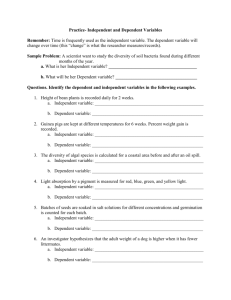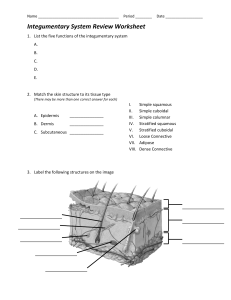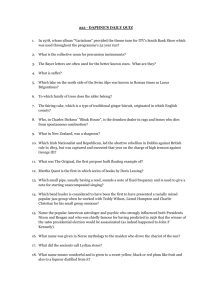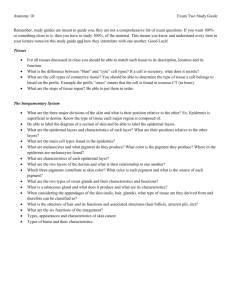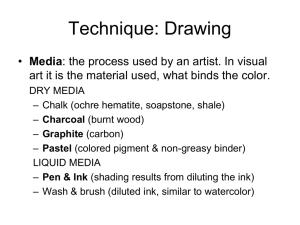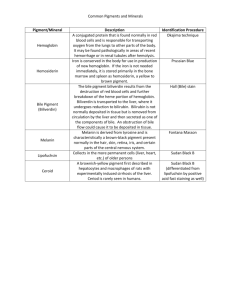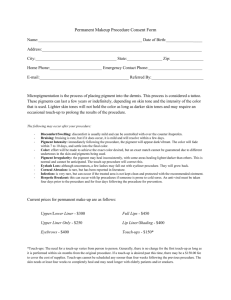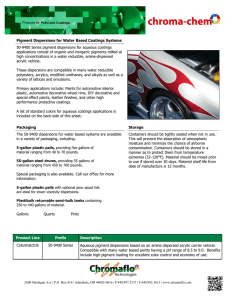Tommy's Supplies . LLC 34 Egypt Rd Unit A Somers , CT 06071 1
advertisement
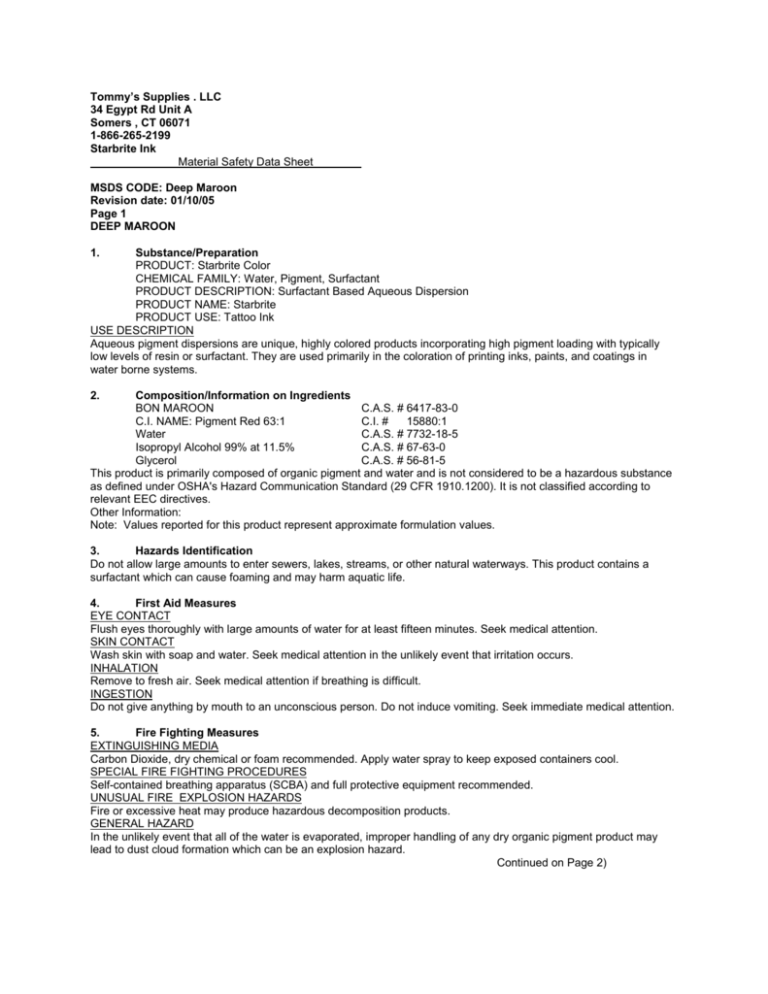
Tommy’s Supplies . LLC 34 Egypt Rd Unit A Somers , CT 06071 1-866-265-2199 Starbrite Ink Material Safety Data Sheet MSDS CODE: Deep Maroon Revision date: 01/10/05 Page 1 DEEP MAROON 1. Substance/Preparation PRODUCT: Starbrite Color CHEMICAL FAMILY: Water, Pigment, Surfactant PRODUCT DESCRIPTION: Surfactant Based Aqueous Dispersion PRODUCT NAME: Starbrite PRODUCT USE: Tattoo Ink USE DESCRIPTION Aqueous pigment dispersions are unique, highly colored products incorporating high pigment loading with typically low levels of resin or surfactant. They are used primarily in the coloration of printing inks, paints, and coatings in water borne systems. 2. Composition/Information on Ingredients BON MAROON C.A.S. # 6417-83-0 C.I. NAME: Pigment Red 63:1 C.I. # 15880:1 Water C.A.S. # 7732-18-5 Isopropyl Alcohol 99% at 11.5% C.A.S. # 67-63-0 Glycerol C.A.S. # 56-81-5 This product is primarily composed of organic pigment and water and is not considered to be a hazardous substance as defined under OSHA's Hazard Communication Standard (29 CFR 1910.1200). It is not classified according to relevant EEC directives. Other Information: Note: Values reported for this product represent approximate formulation values. 3. Hazards Identification Do not allow large amounts to enter sewers, lakes, streams, or other natural waterways. This product contains a surfactant which can cause foaming and may harm aquatic life. 4. First Aid Measures EYE CONTACT Flush eyes thoroughly with large amounts of water for at least fifteen minutes. Seek medical attention. SKIN CONTACT Wash skin with soap and water. Seek medical attention in the unlikely event that irritation occurs. INHALATION Remove to fresh air. Seek medical attention if breathing is difficult. INGESTION Do not give anything by mouth to an unconscious person. Do not induce vomiting. Seek immediate medical attention. 5. Fire Fighting Measures EXTINGUISHING MEDIA Carbon Dioxide, dry chemical or foam recommended. Apply water spray to keep exposed containers cool. SPECIAL FIRE FIGHTING PROCEDURES Self-contained breathing apparatus (SCBA) and full protective equipment recommended. UNUSUAL FIRE EXPLOSION HAZARDS Fire or excessive heat may produce hazardous decomposition products. GENERAL HAZARD In the unlikely event that all of the water is evaporated, improper handling of any dry organic pigment product may lead to dust cloud formation which can be an explosion hazard. Continued on Page 2) MSDS CODE: Deep Maroon Page 2; Revision date: 01/10/05 FLAMMABILITY HAZARD Flash Point: Flammability Limits: Auto ignition Temperature: Min: 100 C Not applicable Not applicable NFPA RATINGS Health: 1 Flammability: 1 Reactivity: 0 HMIS RATINGS Health: 1 Flammability: 1 Reactivity 0 6. ACCIDENTAL RELEASE MEASURES SMALL SPILL Contain spill immediately. Insert materials such as dry sand or sawdust may be used to help absorb any spilled material. Scoop or shovel into appropriate waste containers for disposal purposes. Soap and water may be used as needed. LARGE SPILL Contain spill immediately. Insert materials such as dry sand or sawdust or earth to help absorb large spills. Scoop or shovel into drums for disposal purposes. Prevent runoff from entering into storm sewers, lakes, streams or other natural waterways. Large spills may be toxic to aquatic life and can cause foaming and operational problems at wastewater treatment facilities. Appropriate protective clothing should be worn to prevent exposure. 7. HANDLING AND STORAGE HANDLING Avoid employees’ exposure through the use of appropriate engineering controls, adequate personal protective equipment, and good industrial hygiene practices. Wash thoroughly after handling. Handle in well ventilated work space. STORAGE Store in a moderately cool, dry, well ventilated area away from direct sources of heat. Avoid freezing (32 degrees F). Empty containers may contain product residues and should be handled accordingly. Position containers so that any labeling information is visible. Keep containers closed. 8. EXPOSURE CONTROLS/PERSONAL PROTECTION ENGINEERING CONTROLS The use of local exhaust ventilation is recommended to control emissions near the source. Additional engineering controls should be used as necessary. PERSONAL PROTECTION Safety glasses are recommended. Impervious clothing should be worn when gross contact is likely, such as when cleaning up large spills. Respiratory protection is generally not required. Wash at the beginning and end of each shift. Any Contaminated clothing should be laundered. EXPOSURE LIMITS There is no ACGIH TLV or OSHA PEL's established for this product. 9. PHYSICAL AND CHEMICAL PROPERTIES APPEARANCE: Red, opaque liquid COLORANT: Red 269 SPECIFIC GRAVITY: 1.1-1.4 SOLUBILITY IN WATER: Dispersible BOILING POINT: 65-100 degrees Celsius VOLATILE ORGANIC COMPOUNDS: (VOC's): Negligible (<.05%) PH INFORMATION: 7.0-9.0 ODOR: Slight odor (Continued on Page 3) MSDS CODE: Deep Maroon Page 3; Revision date: 01/10/05 10. STABILITY AND REACTIVITY GENERAL This product is a stable compound and hazardous polymersation will not occur. Since it contains water, do not allow it to freeze. INCOMPATABILITY Avoid strong oxidizing agents such as peroxides, chlorates, per chlorates, nitrates, and permanganates. Oxidizing materials may vigorously evolve oxygen in large amounts. HAZARDOUS DECOMPOSITION PRODUCTS When involved in a fire, burning organic pigment products may evolve noxious gases which are toxic. These compounds may include carbon monoxide, carbon dioxide, and nitrous oxides, or hydrogen chloride, depending on the pigment type used in the dispersion. All of the water must be driven off first in order for this to occur. 11. TOXICOLOGICAL INFORMATION GENERAL Based upon industry wide experience over many years of manufacturing, aqueous dispersion products in general are considered to have a low level of toxicity. There are no established TLV's or PEL's for this product. ACUTE (SHORT-TERM) TOXICITY No known published data is available for the aqueous dispersion. The pigment portion of this product has a reported acute oral LD50 value of 5 grams-kg or greater in rats. CHRONIC (LONG TERM) TOXICITY No known published data is available for this product. MUTAGENICITY No known published data is available for this product. ROUTES OF POTENTIAL EXPOSURE Ingestion Inhalation Eye/Skin contact 12. ECOLOGICAL INFORMATION This product has not been evaluated for its ecotoxicity. However, based upon degradation studies of similarly formulated aqueous dispersions, it can be concluded that the ingredients are almost completely degraded, except for the pigment. The biodegradation of colorants under aerobic conditions is expected to be limited and there is no evidence to suggest they create any significant ecological problems when released into the environment. Since pigments are generally insoluble compounds, they are believed to have minimal bioaccumulation and bioavailability characteristics. Analogous dispersions tested as follows: Rainbow Trout LC50 (24 hours): LC50 (96 hours): Wastewater bacteria EC50 (3 hours) : 720 mg/1 420 mg/1 >10,000 mg/1 Only slightly dangerous to fish, invertebrates, and algae. 13. (WGK 1) DISPOSAL CONCIDERATIONS GENERAL This product must be disposed of in accordance with all applicable federal, state and local regulations. WASTE MANAGEMENT Incineration or land filling are recommended disposal techniques. Contact your state or local environmental agency for specific rules. This product is not identified as a RCRA hazardous waste under 40 CFR to 61, and is not regulated under CERCLA (superfund). (Continued on Page 4) MSDS CODE: Deep Maroon Page 4; Revision date: 01/10/05 14. TRANSPORT INFORMATION D.O.T. SHIPPING NAME (49 CFR 172.101-102) D.O.T. HAZARD CLASS (49 chr 172.101-102) D.O.T. LABEL D.O.T. PLACARD BILL OF LADING DESCRIPTION CERCLA SUBSTANCE (49 cfr) REPORTABLE QUANTITY (RQ) 15. Not regulated None None None Pigments NOI Liquid Not regulated None REGULATORY INFORMATION INTERNATIONAL INVENTORIES: United States: Canada: UN/NA NUMBER IMDG/IACO CLASSIFICATION IATA CLASSIFICATION TSCA Compliance Not registered Not regulated or classified Not regulated or classified Not regulated or classified CAA 602 ODS: This product neither contains nor is manufactured with ozone depleting substance subject to the labeling requirements of the Clean Air Act Amendments 1990 and 40 CFR Part 82.

